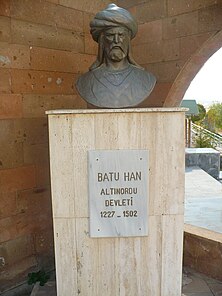Batu Khan

Batu Khan or Batu the Magnificent ( Mongolian ᠪᠠᠲᠣ Bat chaan , Tatar Бату хан , * 1205 ; † 1255 ) was a Mongolian ruler as the son of Jötschis and grandson of Genghis Khan . As such, Batu was the Khan over the Golden Horde he founded .
family
Batus brothers were u. a. Orda , Berke Khan and Shibani . His main wife was Borakchin Khatun. His sons were Sartaq Khan , Ulaqchi , Andewan and Toqoqan, the later khans descended from the latter.
history
In 1236, Batu Khan's troops defeated and subjugated the Volga Bulgarians . Two years later, in 1238, Batu Khan defeated the Russian Grand Duke Yuri II of Vladimir-Suzdal , the uncle of Alexander Nevsky , on the Sit , a tributary of the Mologa . He conquered numerous Russian cities, including the nominal state center of Kiev in 1240 . At the same time, another army advanced against the Kipchaks of the Khans Batschman († 1238) and Kotjan († 1241).
In 1241, Batu's army invaded East Central Europe under his generals Subotai and Baidar and his brother Shibani . After the conquest of Krakow and Sandomir , Baidar defeated a united German-Polish army of knights under the leadership of Duke Heinrich the Pious of Silesia on April 9 in the Battle of Wahlstatt (also Battle of Liegnitz ) . The main army under Batu, Subotai and Shibani moved across the Carpathian Mountains into the Hungarian Plain and defeated the Hungarians under King Bela IV on April 11, 1241 in the battle of Muhi , about 15 kilometers south of Miskolc . They reached the Adriatic Sea and Wiener Neustadt before turning back due to the death of the Great Khan Ugedai and the subsequent disputes over the throne.
Batu Khan was Güyük Khan's most important adversary , and he was able to delay his accession to the throne as Great Khan until 1246. Güyük Khan moved to his homeland on the Imil in 1248 and from there on to the Ili region , supposedly to meet and reconcile with his cousin Batu. On the way he generously gathered an army around him. Batu was warned of Güyük's intentions by Sorghaghtani Beki , so he also raised an army and went to meet him. Seven to ten days' march before the military conflict with Batu Khan, Güyük died, and poisoning was likely.
After Güyük Khan's death, Batu Khan supported Möngke Khan as a possible Great Khan, but the negotiations and intrigues in this regard dragged on until 1251. Eventually he was elected (in the absence of a number of important Genghisid princes) and consolidated his power by disempowering the heir to the throne of the house of Ögedei Khan after a conspiracy and banishing or executing them. Batu Khan became Möngke's co-regent and was largely spared from his administrative measures, which in the medium term favored the division of the Mongol Empire, but initially stabilized Möngke's power in the entire empire.
Batu Khan set up Alexander Newski in 1252 as the sole grand prince of the Vladimir Rus . On his return to the steppe, Batu also founded the Blue Horde in the Volga region .
Batu died in 1255 and his sons Sartaq and Ulaqchi were installed as successors as Khan of the Golden Horde . But a short time later, their uncle, Berke Khan , was able to seize power.
See also
literature
- German A. Dawydow: The Golden Horde and its predecessors . Koehler & Amelang, Leipzig 1972.
- Wassili Jan : Batu Khan . Kiepenheuer-Verlag, Weimar / Leipzig 1989, ISBN 3-378-00041-4 .
- Emanuel Sarkisyanz : The oriental peoples of Russia before 1917. A supplement to the East Slavic history of Russia . Oldenbourg, Munich 1961.
- Bertold Spuler : The Golden Horde. The Mongols in Russia; 1223-1502 . Harrassowitz, Wiesbaden 1965.
Web links
| predecessor | Office | successor |
|---|---|---|
| Dschötschi |
Khan of the Golden Horde 1236–1255 |
Sartaq Khan |
| personal data | |
|---|---|
| SURNAME | Batu Khan |
| ALTERNATIVE NAMES | Batu the Magnificent |
| BRIEF DESCRIPTION | Khan of the Golden Horde |
| DATE OF BIRTH | 1205 |
| DATE OF DEATH | 1255 |